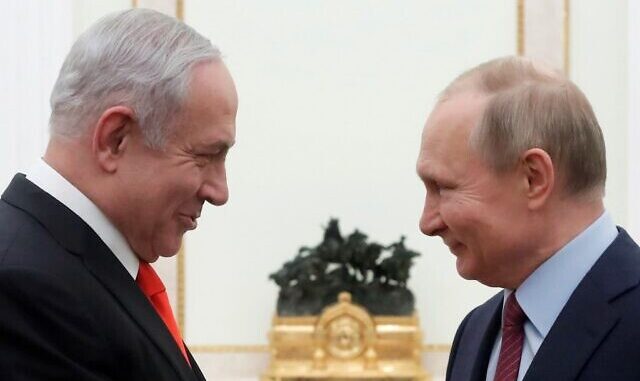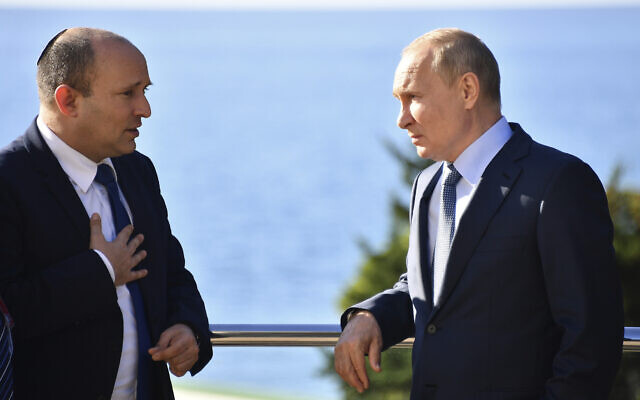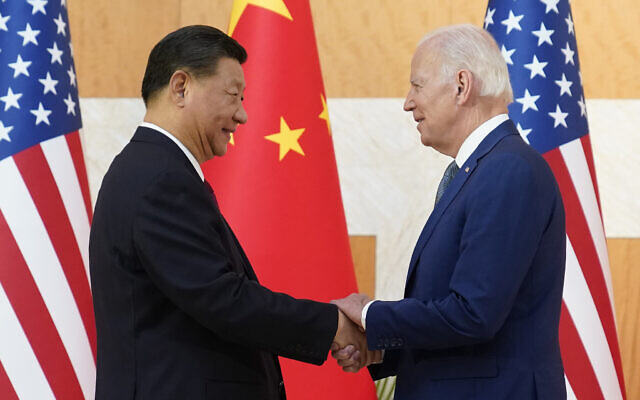T. Belman. Everyday, the US finds something to pressure Israel on. It has no respect for our sovereignty, independence or democracy. It acts like it owns us.
After US pressure, Allenby crossing to Jordan set to open at all hours on weekdays
US ambassador Nides: ‘We will fight against any attempt at annexation
Op-ed: Enough with the American Bear Hug
Time Israel untied America’s apron strings
Amb Nides Boasts: I Work Every Day to Eliminate Jewish Settlements
And don’t forget the Lebanon deal and the pressure to deny a cabinet post to Ben Gvir and Smotrich. The list is endless.
Leaked internal memo says Biden is focusing on threat from Beijing, Moscow, and could lose patience, amid speculation that Netanyahu may draw Israel closer to Kremlin
By LAZAR BERMAN, TOI 23 November 2022,

Russian President Vladimir Putin (right) meets with then-prime minister Benjamin Netanyahu at the Kremlin in Moscow on January 30, 2020. (Maxim Shemtov/Pool/AFP)
Israeli diplomats are warning that the White House could become increasingly frustrated with Israel if its approach toward Russia and China continues to run at odds with US priorities, according to an internal Foreign Ministry document leaked this week.
“The Biden administration wants to place the threat from China and Russia at the center of the agenda, and in our assessment, the level of patience toward allies who don’t contribute to this effort will go down,” reads the report leaked to Channel 13 news on Tuesday.
The document was produced by the ministry’s Center for Political Research.
The warning comes as Likud leader Benjamin Netanyahu is working to put together a new coalition and retake power, raising fears of increased friction with Washington.
During his recent 12-year stint as prime minister, Netanyahu developed a warm personal relationship with Russian President Vladimir Putin, boasting of his close ties with Putin in past election campaigns, while much of Europe and the US increasingly saw the Russian leader as a threat.
Under current Prime Minister Yair Lapid and his predecessor Naftali Bennett, Israel was conspicuously out of step with the policies of the US and other NATO countries vis-à-vis Russia’s invasion of Ukraine.
While providing ample humanitarian assistance and expressing solidarity with Kyiv, Israel has maintained a strict policy of not providing military aid to Ukraine, including systems that could help it intercept Russian missile and drone attacks.
Israeli officials regularly cite the strategic need to maintain freedom of operations in Syria, whose airspace is largely controlled by Russia, as part of its efforts to prevent Iranian entrenchment on its doorstep

Russian President Vladimir Putin (right) and Prime Minister Naftali Bennett speak during their meeting in Sochi, Russia, on October 22, 2021. (Evgeny Biyatov, Sputnik, Kremlin Pool Photo via AP/ File)<
>
<
>
Israeli officials have also expressed fear that advanced military technology could fall into enemy hands and point at production and supply limitations.
Kyiv’s requests for air defense systems — and its public criticism of Israel’s refusal to provide them — have grown more strident in recent weeks, as Iranian-made drones play an increasingly central role in Moscow’s aerial attack on Ukrainian cities and infrastructure.
Israel has also refrained from leveling any sanctions on Russia.
It is not clear whether Netanyahu will change course on the war, in the event that he takes office again, as expected.
Though a scathing critic of the outgoing coalition, Netanyahu praised its “prudent” approach toward Ukraine during an interview last month, highlighting Israel’s absorption of refugees and other humanitarian initiatives while refraining from supplying weapons.
Moscow seems to have hopes that Netanyahu will stay out of the fray, and might even pull Israel closer to Russia. Putin’s spokesman struck a hopeful note last week on relations with Israel, but said it was too early to talk about a possible bilateral meeting between the two countries’ leaders.
“We definitely value constructive relations with our Israeli partners,” Dmitry Peskov said, according to the state-owned TASS news agency.
“It is certainly important for us to see people at the helm of Israel and the government, who share a common approach toward further developing bilateral relations,” he continued.<
>
<
>
Trade in China
Israel’s relations with China are also a potential source of tension with Washington.
In January, Israel’s Foreign Ministry celebrated 30 years of diplomatic ties with China by touting the $18 billion trade relationship between the countries.
China remains Israel’s largest trading partner in Asia; Israel imports more from China than anywhere else and exports more to China than any other Asian country. From 2011 to 2021, the share of Israeli exports to Asia going to China rose from 25 percent to 42%.
However, former US president Donald Trump’s administration and now Biden’s White House have pressured Israel to more closely monitor the trade relationship, especially regarding large, potentially sensitive deals.
In 2019, Israel’s security cabinet announced the formation of an advisory panel on foreign investments in the country, after dragging its feet on the issue for several years while trying to balance its ties with Washington and Beijing.

US President Joe Biden, right, and Chinese President Xi Jinping shake hands before their meeting on the sidelines of the G20 summit meeting, November 14, 2022, in Nusa Dua, in Bali, Indonesia. (AP Photo/Alex Brandon)<
>
<
>
“The honeymoon in relations between Israel and China is over,” former general Assaf Orion, a senior researcher with the Israel-China Policy Center at the Institute for National Security Studies in Tel Aviv, said in August. “A series of indicators show that we are in a new period in relations between the countries and ties are now more complex and freighted than before.
The Foreign Ministry document also stressed that the Middle East is not a priority for Biden.
White House officials regularly deny this assertion. Brett McGurk, the National Security Council coordinator for the Middle East and North Africa, said this week that the US is reinforcing defense infrastructure in the Middle East.
“The United States is now actively building and enabling an integrated air and maritime defense architecture in this region,” said Brett McGurk, the top White House official on the Middle East, said at the Manama Dialogue in Bahrain.
On Saturday, US Central Command chief General Michael Kurilla announced during the same conference that a US-led task force will deploy more than 100 unmanned vessels in the Gulf region’s strategic waters by next year to stave off maritime threats.
Tal Schneider contributed to this report.



So finally the specimen got a job. Obama helps his operatives.